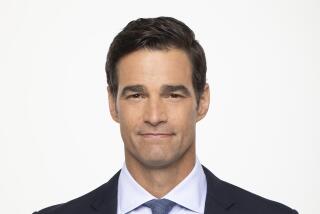Turner Board Meets, Fails to Vote on Time Warner Bid : Business: Action by both sides on the proposed $8-billion merger is expected today. Strong, unexpected dissent is reported.
After meeting for more than eight hours in a marathon session Thursday night, the board of Turner Broadcasting System Inc. adjourned without voting on a proposed merger with Time Warner Inc. to create the world’s largest entertainment company.
The boards of the two companies are expected to convene separately again this morning in hopes of approving an agreement and announcing the $8-billion merger this afternoon.
The Turner board meeting was marked by strong and unexpected dissent from two members. Six and a half hours into the meeting that began midafternoon, Brian Roberts, president of Comcast Corp., and Timothy Neher, vice chairman of Continental Cablevision Inc., stormed out.
Neither would discuss the meeting but sources said that Roberts had said he would abstain from a vote and that Neher was immediately leaving the city and not planning to return for further board meetings.
When Ted Turner emerged from the law offices of Skadden, Arps, Slate, Meagher & Flom near midnight, the usually loquacious chairman of Turner Broadcasting had only a few words outside of “Dad-gummit.” His comments indicated the deal hadn’t been buttoned up as he had hoped.
*
A Turner source said a press conference could still take place today if “everything could be worked out.”
Turner is said to have enough support on his board to proceed with a merger because a long list of concessions has already been worked out with John Malone, chief executive of Tele-Communications Inc., who, along with Turner and Time Warner controls most of the voting shares of Turner Broadcasting.
While Malone’s support is all but assured, sources say Turner is pushing for a consensus of the board to avoid any future backlash against the merger from the cable industry. Comcast and Continental Cablevision, two other leading cable companies, hold board seats and represent a group of smaller cable operators. Together they hold a small equity and voting position because of their help in bailing Turner out of financial straits in the late 1980s. Their support is important for national coverage of Turner cable channels.
Comcast and Continental have been pushing for concessions similar to those granted Malone to go along with the deal, sources said.
The Time Warner board met earlier in the evening and adjourned, prepared to reconvene this morning to vote on the deal. The Time Warner board gave Chairman Gerald Levin the go-ahead to pursue the deal in August, but repeated complications have arisen since then.
Both boards have a variety of complex issues to consider before approving the deal.
Under the agreement, Turner, chairman of Turner Broadcasting, would become vice chairman of Time Warner and his company would become a subsidiary based in Atlanta.
Among other things, sources say, Malone has agreed to convert his 21% equity stake and his voting interests in Turner into nearly 9% of Time Warner, much of which will be put into a voting trust controlled by Time Warner to satisfy antitrust concerns. Time Warner and TCI are the nation’s two biggest cable companies.
While he will not get the dividend he was pushing for on his shares, Malone and other holders of Class C voting shares will receive 16 shares of Time Warner for every 20 they hold in Turner, compared to the 15 shares for 20 that Class A shareholders receive.
*
Under the agreement, Malone will pay discount rates for 20 years for Turner and Time Warner cable networks, such as Cable News Network and Home Box Office, according to sources. Most cable contracts run three years.
Time Warner will also sell Malone the 44% stake in SportSouth owned by Turner. The regional cable sports network, which reaches only about 4 million subscribers, is owned by Turner and Liberty Media Corp., Malone’s programming company.
As part of the deal, the Time Warner board would expand from 15 to 17 seats. Malone, however, would not get one of the two seats on that board; those appointments would be made by Turner, sources said. Turner, meanwhile, would give up his seat on the board of Malone’s company.
According to sources close to the negotiations, the agreement, contrary to previous reports, will not call for a shift of HBO to Atlanta, in part because of objections raised by U.S. West, the regional phone company that owns an interest in that and several other Time Warner assets. Such “management issues,” one source said, would be determined outside the official merger agreement.
More to Read
The biggest entertainment stories
Get our big stories about Hollywood, film, television, music, arts, culture and more right in your inbox as soon as they publish.
You may occasionally receive promotional content from the Los Angeles Times.






